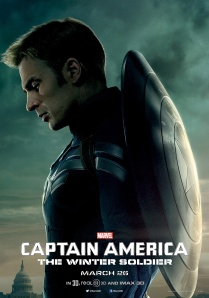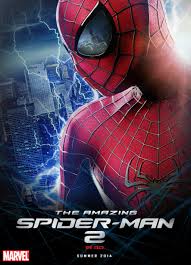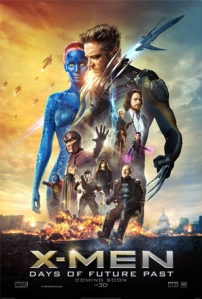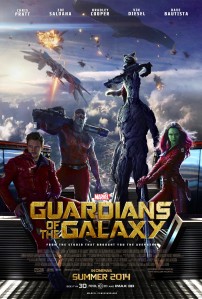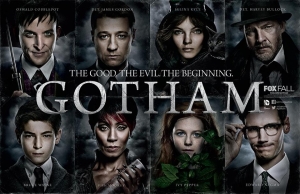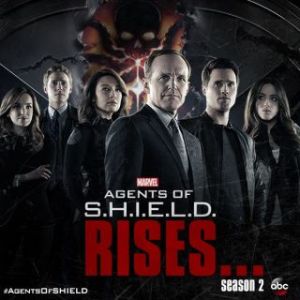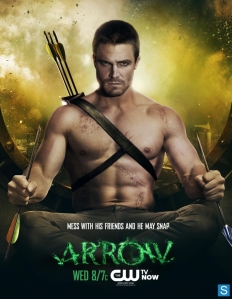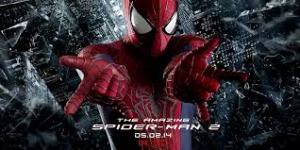Remember when the end of summer meant the end of superheroes? If you could get past August you were free of the masked and superpowered until spring. Six months. That’s the minimum period of regenerative hibernation required before the next explosive, power-punching, evil-thwarting onslaught of hyperbolic do-goodery. This past year Captain America: The Winter Soldier opened in April,
followed by Amazing Spider-Man 2 in May,
before X-Men: Days of Future Past spilled into June.
July offered only the semi-superheroic duo Lucy and Hercules, but August made up with Guardians of the Galaxy.
I admit to seeing all but one of them, but something changed for me this year. Maybe it was the death of Gwen Stacy. It felt like Hollywood’s way of punishing an uppity girlfriend. How dare Gwen figure out how to defeat Electro when Peter couldn’t—and imagine if he had actually followed her to England. Superhero as trailing spouse? Obviously the woman had to die. The seventh installment of the X-Men franchise restored me a bit, with its mildly complex characters making occasionally unexpected choices. Sure, the cast members from the original 2000 film are looking a bit gnarled these days, but we can’t all have anti-aging mutant powers. And, hey, who didn’t have an absolute ball at Guardians? Funniest superhero movie yet. A week later I could barely recall a scene, but that’s normal. It was August. My superhero processing systems were cycling down already. Time to tuck the capes and cowls away for a well-deserved cryogenic nap.
Except, wait, why do I still hear the thumping of a bombastic soundtrack? Superheroes aren’t hibernating this year. They just shrunk down a bit. September has already brought the TV premiere of Gotham
and season two of Agents of S.H.I.E.L.D.
October promises Flash
and season three of Arrow.
Add Constantine, Agent Carter, Supergirl, Teen Titans, and the four Marvel shows in production at Netflix, and the power nap is over. We’ve seen plenty of superheroes on primetime before—Batman, Wonder Woman, Hulk, and Greatest American Hero all boasted multi-year runs in the 70s and 80s—but never so many simultaneously. I can’t resist them any more than I resisted their summer siblings, but I do worry how long the onslaught is going to last.
I actually requested a show like Gotham two years ago. The Fox production isn’t exactly what I described, but I won’t quibble. And I named every supervillain-in-his-youth cameo for my son and wife as we watched. Though was it really necessary to film the Wayne murder scene yet again? Imagine arriving at the crime scene with Gordon and glimpsing little Bruce for the first time. Cut three minutes from the script and that opening could have been dynamic just through a POV change. Instead we get a repeat, something closer to Nolan’s Batman Begins than Burton’s Batman. The WB has managed to throw in some bare-chested goofiness into Green Arrow’s character, but DC is keeping its dark and dire palette for the bigger network.
S.H.I.E.L.D. had a firmer grip. Last year’s series premiere was flawed but hopeful—and then the follow-up episodes were some of the worst TV I’ve ever sat through. I don’t know how they made it to mid-season, but I’m glad they did, because the final season arc was one of the best long-term plotting coups a series ever pulled off. This year opened at a sprint, with the expanded cast and juggled originals introduced with gloriously little exposition—a huge trick given the upheavals in status quo the last Captain America film forced on the show. Though my favorite moment was a narrative sleight-of-hand employed for the new characterization of an old but radically altered returning character—one of those look back and reevaluate a half dozen scenes when you realize brain-damaged Fitz is only hallucinating Simmons. Oh, and bad Ward grew a beard and lives in the basement now—just like the dragon in the first season of the BBC’s Smallville-inspired Merlin.
So, yes, I guess I can’t complain about the superhero’s autumnal shift to the small screen. I’m their audience. But what happens next spring? Will we have recovered enough for The Avengers 2: Age of Ulton in May? Or Ant-Man in July? Or Fantastic Four in August? Or the following year when have to go see X-Men Origins: Deadpool and Batman v Superman: Dawn of Justice and Captain America 3 and X-Men: Apocalypse and Teenage Mutant Ninja Turtles 2 and Doctor Strange and Shazam! and Sinister Six? All that after having just watched Daredevil, Luke Cage, Jessica Jones, and Iron Fist combine forces on Netflix’s The Defenders? Plus the other seven planned superhero shows airing fall and winter?
It’s not quite genre domination–there are still more cops and doctors and lawyers on TV than I can list–but have two publishing companies ever generated so many simultaneous franchises? Marvel and DC are spreading their genes faster than the zombie plague. The superhero apocalypse is here. Will we survive it?

